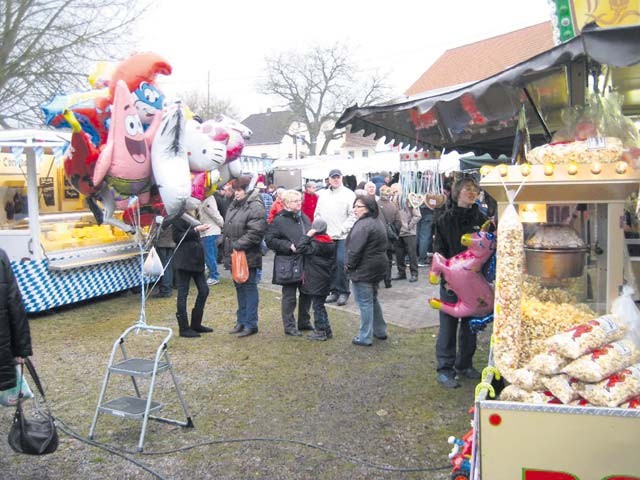
On Wednesday, the Quirnbach horse market will feature vendors selling food, sweets and a variety of merchandise.
The “Quirnbach Horse Market,” a one-of-a-kind fest, lures visitors the second Wednesday in November to Quirnbach. The event will include horse presentations, horse awarding ceremonies, vendors, food specialties, musical entertainment and a lottery.
“We are a village with 500 inhabitants and last year about 15,000 visitors joined us for our horse market,” said Elke Blomeyer from the organizing team. “About 60 horses of 10 breeds will be presented starting at 10 a.m. Wednesday.”
Show performances will take place in between each individual horse presentation. After the horse awarding ceremony, some horses will be up for sale.
“We’ll also have about 100 vendors’ stands offering a variety of merchandise including clothes, horse equipment, art and crafts items, jewelry and sweets,” said organizing member Volker Zunkel.
Food stands will serve potato waffles, bratwurst, pea soup, ham hocks, pizza and more.
“Visitors can enjoy musical entertainment in our fest tent by the band Die Filzbacher throughout the day, and at night the band Members will perform until the next morning,” said Stefanie Koelbel, Quirnbach’s mayor. “We hope many visitors from all over come to our little village. Since it’s an American holiday, we would like to welcome many American friends.”
The horse market is famous for its lottery, where nice prizes can be won.
“Prizes include a seven-day boat cruise for two persons, one overnight with dinner for two persons in a regional hotel, a tablet PC and more,” Zunkel said.
Tickets cost €1 and are being sold in the village and at the market.
“The Quirnbach horse market is based on a long market tradition,” Blomeyer said.
In 1444, historical documents mention the first market in Quirnbach called “Bartholomaeusmarkt.” The local church, Bartholomaeus Church, was known as a place for pilgrimage. Along with the pilgrims, vendors came to sell all kinds of merchandise. Quirnbach turned into a community with monthly markets after the town of Kusel was burnt down during the French Revolution in 1794. The Kusel markets had to move to Quirnbach. According to a document dated April 26, 1799, every third day of each month a cattle market was authorized. After Kusel was rebuilt, city officials wanted the markets back, but vendors and farmers from the local areas and even the neighboring countries wanted to keep going to Quirnbach. During the years 1856 and 1857, 25 markets were held each year in Quirnbach. Local people made good money with the many restaurants and taverns they needed to feed all of the visitors.
After around the middle of the 19th century, horses were not only owned by noble people but also used as draught animals by farmers. Quirnbach decided to hold its first horse market in 1877 on St. Martin’s Day. November was a good date for the farmers; the crops were in and the financial situations were balanced. People had the time to visit the horse market. They sat together, celebrated, had fun and they started having dances. At that time, since it was still customary for parents to engage their children without asking them, the horse market turned into the “marriage market.”
Also, the village asked the government to give authorization to hold a lottery, where people could win household items and agricultural machines. The main prizes were horses. The first time, 5,000 lottery tickets were sold. In 1892, 24,000 tickets were sold and in 1893, more than 300 ticket vendors traveled through the Pfalz to sell the tickets.
After World War II due to a growing motorization of agriculture, the cattle and horse market lost its importance. There were streets better suitable for farmers which allowed them to visit their cattle dealers at any time and not only during the market.
Soon Bartholomaeusmarkt was celebrated as a village carnival.
In the beginning of the 1980s, community officials, local clubs and business people helped to revive the horse market and the lottery.
Quirnbach is located near Glan-Muenchweiler on A62.
The main road in Quirnbach will be closed to motorized traffic.
The German railroad company will offer additional train departures between Kusel and Glan-Muenchweiler and Kaiserslautern and Glan-Muenchweiler. Busses will be available at the Glan-Muenchweiler train station to take visitors to the horse market. For details, visit www.vrn.de.


